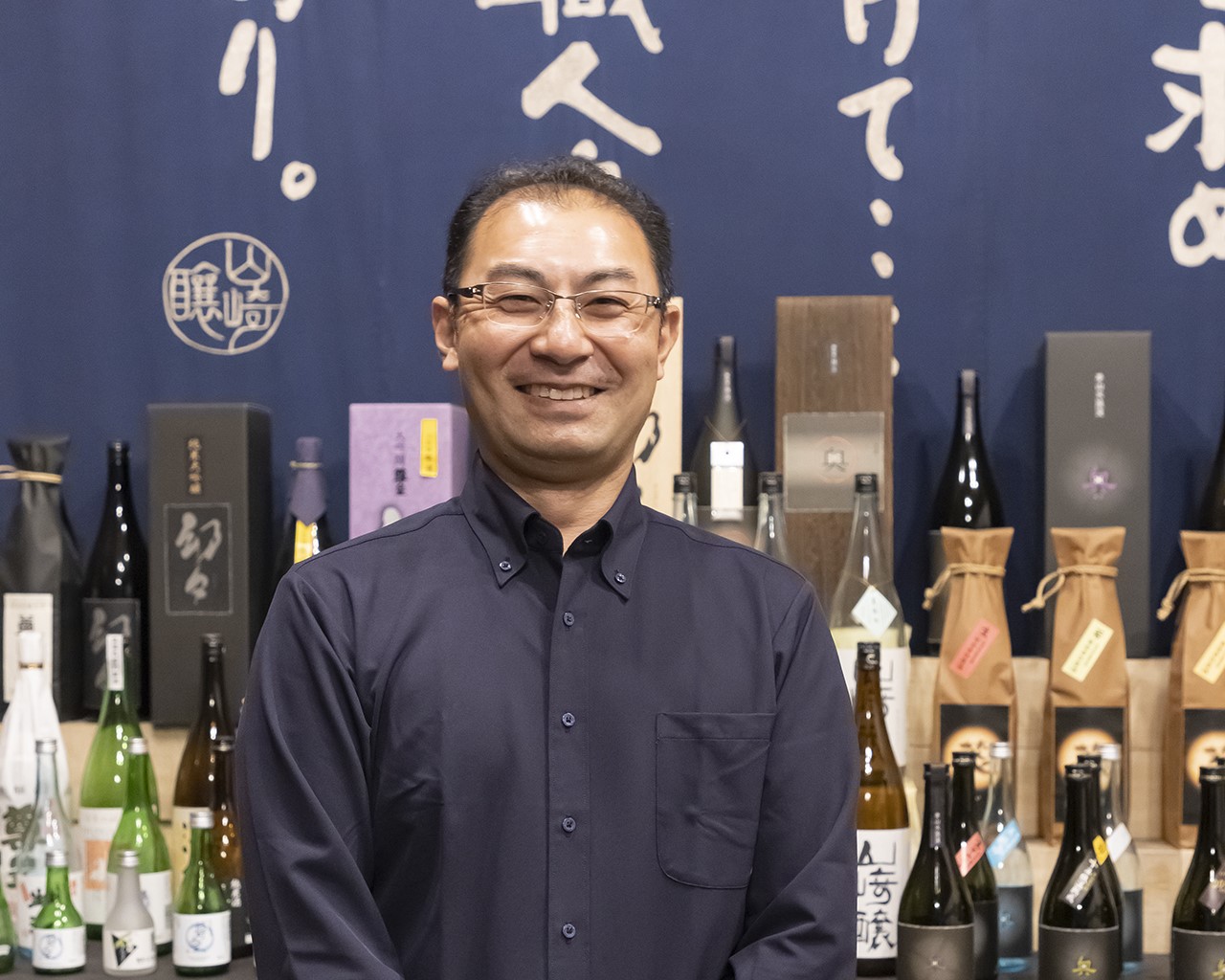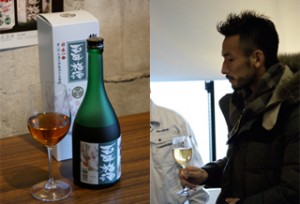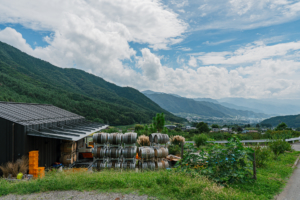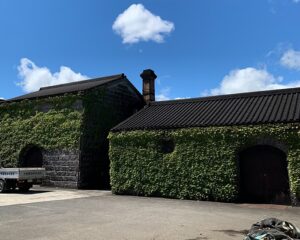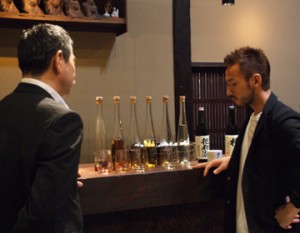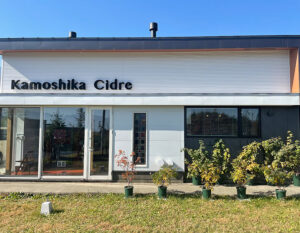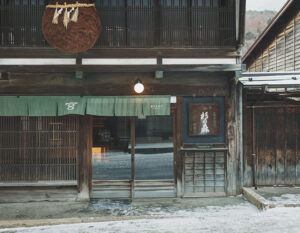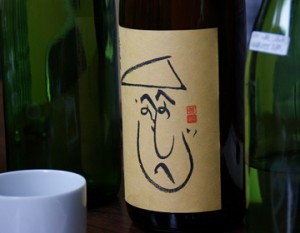Yamazaki Limited Partnership, founded in 1903 in Hazu, Nishio City, Aichi Prefecture, is a long-established brewery known for its sake “Sonno. Since its establishment, the company has been making sake under the belief that “local sake is nurtured by the climate,” while embraced by the nature of Hazu. The sake made with rice developed in the Okumikawa region of Aichi Prefecture has timeless value.
The “Honorable Emperor” was born in a small village overlooking the ocean.

Hazu area, Nishio City, Aichi Prefecture. Yamazaki Goshi Kaisha was founded in 1903 in this rich natural setting overlooking Mikawa Bay to the south. The brewery’s philosophy from its inception was to “brew sake that cannot be found anywhere else,” and in 1920 it launched “Sonno,” which has remained one of the brewery’s most popular brands for more than 100 years.
Today, in addition to Sonoh, the brewery produces more than 10 other brands, including “Oku,” “Gennai,” and “Nengoichi. Some of the brands range from junmai daiginjo-shu to regular sake, and the total number of products handled by the brewery is said to be more than 50.
The best sake for Aichi Prefecture’s richly flavored

The brewery uses locally grown rice from Aichi Prefecture and groundwater pumped up from the foot of Mount Mikane, located north of the brewery. The idea that “sake is a gift from the climate” has remained unchanged since the brewery’s founding. In Aichi Prefecture, where sake production has flourished since the Edo period, the production of fermented seasonings such as Mikawa Mirin, a secondary processing of sake lees, also flourished. Against this backdrop, Aichi Prefecture developed its own local foods that are said to be richly seasoned, such as broiled eel sweetened with Mikawa mirin and “dote-ni” and “miso katsu” using red miso, which originated in the prefecture and has a rich flavor and aroma. Yamazaki Goushi Company’s sake, which has a robust flavor, is the best match for this “strong flavor,” according to the company’s senior managing director, Hiromasa Yamazaki.
Yumesansui, rice for sake, born in the Okumikawa region

All mainstay products, such as Sonoh and Oku, are made from sake brewing rice produced in Aichi Prefecture. Yumesansui,” which is said to be the highest quality rice among them, was bred and developed for mountainous areas by the Intermountain Agricultural Research Institute of the Aichi Prefectural Agricultural Experiment Station at the strong desire of local farmers and sake brewers in the Okumikawa region. Yamadanishiki”, a rice suitable for sake brewing, was used as the mother strain, and “Chubu 44”, a sister strain of “Chiyonishiki”, was used as the father strain, and the rice was developed and improved in 1998.
In 2014, Yume-Ginko, a sake brewing rice for flat areas, was also created. In 2019, Yamadanishiki from Aichi Prefecture will be introduced, giving sake brewers more options for locally produced sake rice.
A new brand that deepens the “depth” of sake [Oku]

One of the main brands, Oku, is made using 100% Yumesansui. Although they were the first to introduce Yumesansui, they struggled to commercialize it. After four years of trial brewing, it was finally developed. The development concept was “to make sake with a strong aroma and a strong flavor. True to this concept, the alcohol content of Oku is all higher than 18%, which is high for a sake. Mr. Yamazaki puts a lot of effort into his words, saying, “Oku cannot be made with less than 18 degrees.
Yamazaki Limited Partnership uses its own rice to polish Yumesansui to a 22% polishing ratio, achieving a finish with no cloying taste. The beer has a high alcohol content and high aroma, but has no cloying taste. The name “Oku” was derived from the strong desire of the previous president who developed the sake to “deepen the “depth” of sake.
The characteristics of the brewery can be recognized by its ingredients, and the technology of the brewery can be recognized by its aftertaste.

Mr. Yamazaki says, “I think the “hint” of sake in the mouth is a characteristic of the brewery. I believe that a brewery’s skill comes out in the aftertaste,” he says. The “aftertaste” that Mr. Yamazaki and his team are aiming for is a clear taste with no clutter. In 1993, they built a new warehouse with air conditioning and refrigeration. All products in the warehouse can now be stored at low temperatures.
The brewery also focuses on “Kare Rashi,” or drying the rice and freshly made koji after polishing. The koji is then dried and the koji is dried in a process known as “kareraki,” which takes time to remove any impurities. When Mr. Yamazaki tasted sake made through this process for the first time, he was surprised at how different it was.
Even if it is said that we are “going against the times”… we want to maintain our pride.

Since 2020, an increasing number of sake breweries have been producing low-alcohol sake with a gorgeous aroma, but Yamazaki Goshi Kaisha handles a lot of nama sake, and all of its products have a high alcohol content. Oku has a basic alcohol content of 18 degrees, and Sonoh is around 17 degrees. Mr. Yamazaki prefaces his comments with the following: “The times may be changing to lower alcohol,” he says, “but some of these dark sake products have a strong flavor, and I am sure there are core fans who like this type of sake. I am sure there are core fans who like it, and I want to protect it for them.
Considering the Next Step in the Diversifying Alcohol Industry

Mr. Yamazaki says, “I think there are all kinds of sake qualities in the world. When I think about my next move, it is difficult to come up with what to make. For this reason, he is tireless in his research and development of new products.
In 2013, they launched the completely alcohol-free amazake “Ichikouji. a completely alcohol-free amazake. From koji making to bottling, the sake brewing techniques that have been cultivated over a long period of time were fully incorporated into the product. Of course, the rice is grown in Aichi Prefecture and the rice polishing ratio is 60%. Although no sugar is used, the sweetness of the rice can be felt. Flavors using Nishio City’s specialties, such as powdered green tea and ancient rice, are also available, offering a different taste of this long-established brewery.
Local sake is nurtured by the climate.

Seventy percent of the sake produced at the brewery is consumed in Aichi Prefecture, and the rest is sold through distributors nationwide. The brewery plans to focus on expanding sales channels and building brand awareness. We would like to make it known that our brewery brews locally produced sake with locally grown rice,” he said. I think this will lead to the promotion of Aichi’s food culture,” says Yamazaki.
Local sake is nurtured by the climate, and the people who live here also eat from this climate. I would like to develop sake that goes exceptionally well with the environment surrounding this brewery. The philosophy that has continued since the brewery’s founding, “Sake, like everything else, is a product of the climate,” has not changed over the past 120 years and will continue to be passed down to the next generation.



